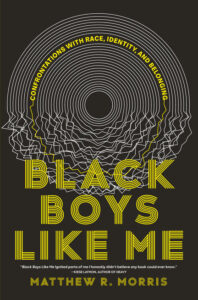February 13, 2024
Black Boys Like Me, by Matthew Morris
Three pages into the first essay in Matthew Morris’s new collection BLACK BOYS LIKE ME: CONFRONTATIONS WITH RACE, IDENTITY, AND BELONGING, and I was hooked, as Morris describes a 4am journey through Brooklyn, the way he adapts his performance of self as he passes a police station (“stage my innocence”) versus how he would have acted if he’d run into another Black man on the subway who presents himself in public as Morris does (“I would have amplified my Blackness—for survival”). The former I could have discerned, but I’d never considered the latter—how racism and anti-Blackness could be as pervasive as that.
I loved this book, each essay blowing my mind a bit, framing the familiar in ways that are new to me. How does Morris, as a Black middle-school teacher, get dressed to go to work in the morning, and how are his fashion choices judged in comparison to those of his white colleagues? (What is “professionalism” anyway? What kind of people get to “profess”?) “Still, how are the Jordans I chose to wear to work less professional than the boat shoes Tanner rocked?” He writes about his mom buying him a Snoop Dogg CD when he was nine at the Sunrise Records at Cedarbrae Mall, and what hip hop has meant as a reflection of Black identity when there is so little representation of Black masculinity in pop culture otherwise, but what was complicated about that: “Those rappers were me, but that didn’t mean I was them. Outsiders couldn’t see the difference.” About pursuing his dream of NFL stardom, and the what that pursuit did to his body—he connects the distribution company where his dad worked (and where Morris and his brother worked the summer before he left to play football in Ohio), a company where the workers on the floor were all people of colour, and management was white, to professional sports where white owners reap their fortunes from the bodies of Black athletes. Though the connection is made implicitly, and this is the art in these essays, Morris laying out the evidence and letting the facts speak for themselves.
And herein lies the artistry at work here, in terms of structure, and prose that calls attention to itself in the most vivid and compelling way. I’m going to suggest that that first Snoop Dogg CD was the beginning of an education in the poetics of hip-hop, and that the influence of that poetics is discernible on every page of this book. Although I feel like I’ve never been more middle-aged white lady as when I’m supposing I can discern the influence of hip hop, um, anywhere, but there is just such a rhythm and a feel to Morris’s sentences, their cadences and alliteration. And then I think of the essay “The Fresh Prince Syndrome,” teenage Morris performing Will Smith’s character in school…because the alternative was being Carlton and alienated from his peer group, and I think of the high school teachers who wrote Morris off for being the smartass Black kid mouthing off in the back of the classroom, and is my supposing the influence of hip-hop similar to that, as opposed to a more traditional kind of literary influence? (What is tradition? Who gets to tradish?)
A thread running through all these essays is Morris’s relationship to his family, especially his mother (who was white, with a Polish-Jewish background—interesting to encounter not long after reading James McBride’s memoir THE COLOUR OF WATER), and—more subtly, but essentially—his younger brother, whose trajectory of life as a Black man would be wildly divergent from Morris’s for awhile. While Morris pursues his football scholarship dreams, his brother gets involved with drugs, with drug dealing, and eventually winds up in prison. “Despite thirty years spent knowing and touching and loving each other, we couldn’t be further apart in the routes we’d taken to preserve the collective sense of what Black masculinity meant to us. Of what Black boyhood had meant.”
BLACK BOYS LIKE ME is a complicated work with multitudinous facets, and every one of these surfaces shines. This book is a celebration and a gift.







One book I read and loved a while ago was “Bedroom Rapper” by Rollie Pemberton. Yes, Pemberton is from Edmonton (currently lives in Hamilton), but I loved reading his essays on hip hop and growing up on the prairies, and how a working dj and rapper survives. I listened to the audio book, which was great.
I learned a great deal about hip hop and djing.